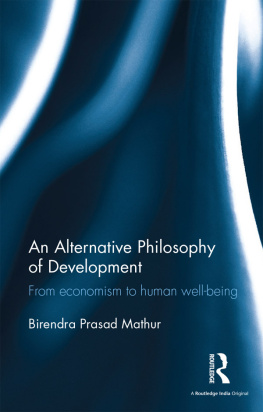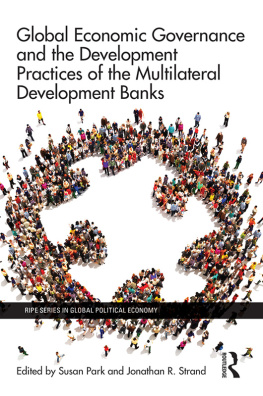ECONOMIC DEVELOPMENT
WHAT EVERYONE NEEDS TO KNOW
ECONOMIC DEVELOPMENT
WHAT EVERYONE NEEDS TO KNOW
MARCELO M. GIUGALE


Oxford University Press is a department of the University of Oxford.
It furthers the Universitys objective of excellence in research, scholarship,
and education by publishing worldwide.
Oxford New York
Auckland Cape Town Dar es Salaam Hong Kong Karachi
Kuala Lumpur Madrid Melbourne Mexico City Nairobi
New Delhi Shanghai Taipei Toronto
With offices in
Argentina Austria Brazil Chile Czech Republic France Greece
Guatemala Hungary Italy Japan Poland Portugal Singapore
South Korea Switzerland Thailand Turkey Ukraine Vietnam
Oxford is a registered trademark of Oxford University Press
in the UK and certain other countries.
What Everyone Needs to Know is a registered trademark of Oxford
University Press.
Published in the United States of America by
Oxford University Press
198 Madison Avenue, New York, NY 10016
Oxford University Press 2014
All rights reserved. No part of this publication may be reproduced, stored in a retrieval system, or transmitted, in any form or by any means, without the prior permission in writing of Oxford University Press, or as expressly permitted by law, by license, or under terms agreed with the appropriate reproduction rights organization. Inquiries concerning reproduction outside the scope of the above should be sent to the Rights Department, Oxford University Press, at the address above.
You must not circulate this work in any other form
and you must impose this same condition on any acquirer.
Library of Congress Cataloging-in-Publication Data
Giugale, Marcelo M.
Economic Development: what everyone needs to know /
Marcelo M. Giugale.
pages cm
ISBN 9780199328130 (hardback : alk. paper)
ISBN 9780199328147 (paperback : alk. paper) 1. Economic development. 2. Economic policy. 3. Social policy.
4. GlobalizationSocial aspects. I. Title.
HD82.G548 2014
338.9dc23
2013026014
1 3 5 7 9 8 6 4 2
Printed in the United States of America
on acid-free paper
In Memory of Alicia Tamburelli
Gracias por todo, Vieja!
CONTENTS
Imagine that you want to get a feel for modern surgery. You may be an undergraduate student pondering medical school. Or a journalist researching a story about the new, cool things medicine can do. Or a politician trying to sound credible on health-care reform. You may be one of those patients who wants to understand what the doctors are about to do to her. You could also be an experienced family physician who needs a quick refresher on the latest surgical techniqueswhich you may rarely practice. What is the best and fastest way to go about it? Simple: you get a friendly surgeon to lend you scrubs, take you inside the operating room, and let you witness a few actual operations. No lectures, no theories, no jargonjust a direct glance at the real thing. Well, that is in essence what this book does for those who are interested in economic development.
A series of short questions and answers, written in kitchen-table language, explain the issues that policymakers face, tell what the most promising instruments are in helping societies prosper, and show the limits of what we know. In fact, the idea is to get you to the frontier of the development profession, the point at which knowledge stops and ignorance starts, and to share with you what we dont know, and make you think for yourself.
There will be no master conceptual framework. There will be no formulae, tables, or charts either. Rather, we will talk, first about governmentsafter all, they are the ones who make decisions on policyand about how they so frequently fail at what they do. We will then turn to the kind of economic policies without which no country can make it. Here is where technical orthodoxy will be translated into common sensethink about macroeconomic consistency, balanced budgets, and monetary stability as making ends meet for a country as a whole. From there, we will look at the excitement and the frustration that new tools and new realities are bringing to poverty reduction, social inclusion, education, health, technology, infrastructure, foreign aidyou name it. In the end, we will see all these tools in action in the region that represents developmentand the need for itbetter than any other: Africa. If, after all that, you are thirsty for more information, you will find a Bibliography of suggested further readings. Some of them are classic, must-read books. Some are journal articles that changed the way economists think. And many are available online for free.
Three disclaimers before we go into the operating room. First, earlier versions of these essays have been published as blogs, opinion editorials, or both, in print or online. And I have tested the ideas in this book during dozens of lectures and speeches at universities in Africa, Europe, Latin America, and the United States. This allowed for people to comment and for me to learn from those comments. Second, I have spent the past quarter century working for the World Bank, on four continents and in many capacities. There is no better institutional balcony from which to witness developmentits actors, sectors, thinkers, places, lessons, and challenges. Still, the views conveyed here are my own, and they do not necessarily represent those of the World Bank or of the countries that own it. Third, I belong to no political party, commercial enterprise, interest group, or intellectual movement. So I am free to speak my mind.
Marcelo Giugale
Fall of 2013
@Marcelo_WB
There are many colleagues in and around the profession who I would like to thank for teaching me so much and for helping me make Economic Development: What Everyone Needs To Know a reality. Omar Arias Nancy Benjamin, Paul Brenton, Otaviano Canuto, Daniel Cotlear, Andrew Dabalen, David de Ferranti, Shantayanan Devarajan, Makhtar Diop, Ejaz Ghani, Markus Goldstein, Kai Kaiser, Olivier Lafourcade, Gladys Lopez-Acevedo, Margaret Miller, Remy Prudhomme, Anand Rajaram, Fernando Rojas, Jaime Saavedra, Apurva Sanghi, Christopher Sheldon, Antoine Simonpietri, Volker Treichel, Jose Molinas Vega, Eduardo Velez, and Steve Webb either educated me in their respective fields or graciously invited me to comment on subjects they know much better than I.
Alex Fleming, Ellen Harvey, Michael Jelenic, and Susan Petersen encouraged me to see and tell the human story behind each technical issue, no matter how complex. Cristina Palarca has over the years kept me organized in my day job, so I could spend nights, weekends, and airplane hours writing. And Angela Chnapko, my publisher, saw the beautyand took the riskof bringing the trenches of the war on poverty to the hands and iPads of those who are not poor.
More personally, I am one lucky writer, blessed by the love and support of an incredible family. My kidsCarla, Lauren, and Juancheered me along and patiently put up with my passion for explaining things. And Pichu, my beloved wife of twenty-eight years and my best friend, taught me that all problems in society really boil down to one solution: a good education. As a Special Ed teacher for some of the most special children there are, she should know.
To all, thank you.
Marcelo Giugale
Fall of 2013
@Marcelo_WB
ECONOMIC DEVELOPMENT
Next page





